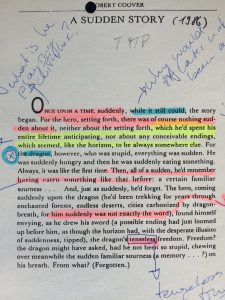Introduction to Literature. Fiction. The session on narrative perspectives – something that teachers often love, but first year literature students just as often dread (close to the horrors of metrical feet in poetry). Nevertheless, the syllabus calls for a discussion of either Franz Stanzel’s narrative situations, Gerard Genette’s narration and focalization, or both.
What can we do to make all of this at least a little exciting?

Robert Coover’s 1986 short short story, “A Sudden Story,” lends itself well not only to an analysis of its narrative perspective, but also as a practical exercise for students struggling to distinguish between narrative situations and different modes of focalization. Applying Genette’s theory of narration and focalization, it quickly becomes apparent that Coover employs a heterodiegetic narrator (a third-person narrator located outside of the characters’ world) with both zero and then multiple internal vocalizations. They provide the perspectives of both the hero and the dragon on the events of the story.
What really gets the students going is their own re-write of the story from two different autodiegetic perspectives – the hero’s and the dragon’s. Depending on class size and time available, this writing task can be done as a group assignment, by student pairs, or as a solo project. By adding their own ideas, students become sensitive to the different perspectives. While the hero, for instance, has been preoccupied with meeting the dragon throughout his entire journey, the story focuses only on the culmination of the hero’s quest. The dragon, on the other hand, is unable to understand the encounter due to his lack of long-term memory.
Useful scaffolding is to assign the perspectives of the dragon and the hero according to the students’ skill levels rather than letting them choose for themselves. It comes as no great surprise that the dragon’s perspective is usually harder for students to identify with and recreate in their stories.
Here are some student examples from my “Introduction to Literature” seminars:
Autodiegetic – Hero
- “I’ve finally found the dragon I’ve been trying to kill for years. It sure took me a long time to cross that endless desert, but, at last, here he is! Time to finish this!”
- “When I set forth, years ago, I almost gave up. It wasn’t until I found the cities crystalized by dragon breath that I finally managed to track him down.”
Autodiegetic – Dragon
- “I’m eating. This tastes weird. What is it? I’m hungry.”
- “Nom nom, food! What’s that? Hunger. What?”
Alternatively, “A Sudden Story” can also be employed as an exercise on Stanzel’s narrative situations that may lead students to the following results:
Figural narration – Hero
- “The hero has spent years tracking the dragon, through deserts, forests, abandoned cities. Now he has finally found it and wonders about its size. He thinks he might have made a mistake.”
Figural narration – Dragon
- “The dragon is hungry. The dragon has found something to eat. For a moment, it tastes familiar, but then it no longer does. The dragon is hungry. So hungry.”
First-person narrator – Hero
- “My entire life I’ve anticipated this encounter, and this is what it’s come to? This? All that trekking through enchanted forests and endless deserts and …”
First-person narrator – Dragon
- “I eats.”
After students have completed their tasks, I collect their stories in a plenary session and discuss the results, making students identify possible mistakes (at least one or two students usually struggle with properly keeping to the dragon’s limited awareness and end up with stories way too elaborate). I also discuss how students identified the information relevant to their assignment in the story and how this technique might be fruitfully applied to other stories where questions of Stanzel’s narrative perspectives or Genette’s narration/focalization crop up.
As a final note, I will leave you with one question: Which one of the two perspectives is actually more conducive to leading a happy life – the hero’s or the dragon’s?
29,995 Total Views, 16 Views Today






